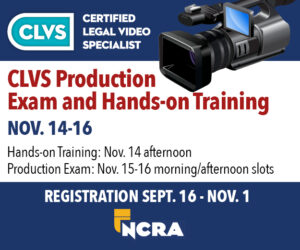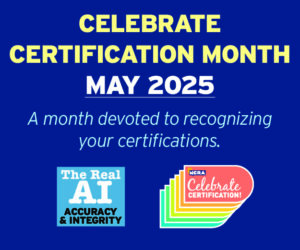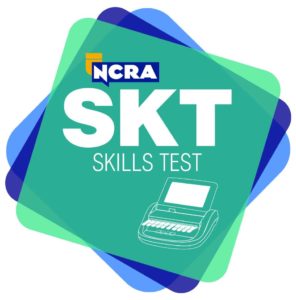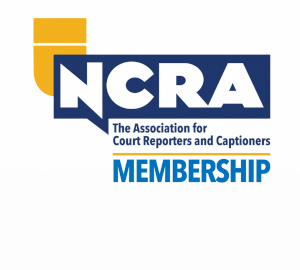Several court reporters and captioners striving for certifications decided to use Zoom to create a place where they can practice together. Led by Donna Prather, RMR, CRR, CRC, a federal official in Abingdon, Va., the sessions have become a great way to stay in touch and work toward a goal together. Whether you’re trying to nail a certain speed test or just want to improve your speed, Prather recommends joining a group or creating your own with friends and colleagues.
JCR | Why did you start a practice group? When and where did it start?
PRATHER | HSZ, or High Speed Zoom, started when a handful of us in Rich Germosen’s 100-Day Challenge Facebook Group were all striving to pass the Testimony portion of the RMR: Jennifer Billstein-Miller, RMR, CRR; Nicole Rubia Bulldis, RPR; Dineen Squillante, RPR; Nicole Terlizzi Kochy, RPR, CRR, CRC; and Patricia Bidonde, RPR. Thanks to COVID, we got to make great use of our lack of drive time, so we decided to share material and practice together.
JCR | Did you have a goal for yourself? For the people in the group?
PRATHER | The goal of most of us when starting HSZ was to pass a leg or legs of the RMR, although some were working on RPR or CRR. But as we’ve all been told, get your speed first, then the CRR will be much easier to obtain. Finding material at that speed can be challenging. So I started a folder and put all the high-speed testimony dictations I could get my hands on in one place. Then Nicole Bulldis figured out how to use iTunes to break down a five-minute take into one-minute takes. So, we spent hours breaking down dictations to use for speedbuilding, and we used EV360 to play the one-minute takes at varying speeds.
JCR | Can you describe a typical practice session?
PRATHER | Typically, we started off with a warm-up — anything between 250, 260, 280. We tried to use the various recommended methods of those who have gone before us to build speed. We might play a 280 Speed Contest for five minutes, then do that same take one minute at a time. So, minute one would be played at 260, 270, 280, 290, 300, then we would go on to minute two. In between, we would share common briefs or ways to shorten our writing. Toward the end of practice, we would play the entire five minutes again at speed or just slightly above, finally ending with a fresh five-minute take at testing speed of 260. This usually takes an hour.
JCR | With goals, are there typical events that you celebrate as a group or a way that you celebrate someone reaching a goal?
PRATHER | We do give a “Yippee!” in the group if we know someone tested. However, most of the celebrations happen in the 100-Day Challenge group. Rich Germosen, RDR, CRR, and his crew are on top of all the passes and make announcements for everyone to share the love and cheers.
JCR | How do you keep people motivated?
PRATHER | The motivation comes from within. We all have good days and bad days writing, but practicing together has been so rewarding! I personally have made many new friends. In addition, and maybe most important, time flies by. We tag each other in our posts to hold each other accountable.
JCR | What advice would you give anyone who wants to start practicing?
PRATHER | Come on in! We practice at the same time every day (6 p.m. EST), and we use the same link every day. Different people lead now due to our busy schedules. The takes aren’t always testimony now, but the group focuses on high speeds.
JCR | What are the benefits of practicing?
PRATHER | The benefits of practicing daily are innumerous! My everyday work has just become so much easier. Even after many have passed their RMR or RPR, they still keep practicing in HSZ. There are many things you can work on other than writing every take perfectly:
1. You can work on a certain phrase or brief, just listening for it.
2. You can practice dropping certain words.
3. As a group we have checked our stroke count after a one-minute take and compared. Your goal is to get the segment in as few strokes as possible without dropping. This way you can see improvement too. Traci Mertens, RDR, CRR, CRC, has been a huge help in offering different ways to focus on different little things. So even on a bad writing day, there is something to be gained from practice. This is what helps the students gain something when they are attempting to write at 300 wpm. If they are working on a specific phrase that gives them fits, just hearing it at 300 and writing it as quickly as possible will help them at the lower speeds.
4. Sometimes we write until the first drop, then immediately stop and figure out what caused the drop. This is huge! Realizing what is causing the drop and perfecting it allows you to progress. Writing the same take and making the same mistakes is, well, you know, crazy. You start over and keep doing this process over and over.
Also, before we started HSZ and the 100-day club, I used to get CDs from NCRA and practice to them. However, for some reason it never occurred to me to practice above that speed. So just seeing what other people are practicing and learning how to practice and adjust the speeds made the biggest difference.
In addition to Traci, we have had many people join our group for motivation and inspiration from Rich Germosen, RDR, CRR; Allie Hall, RDR, CRR; Doug Zweizig, RDR, CRR; Ron Cook, FAPR, RDR, CRR, CRC; Donna Urlaub, RMR, CRR; and Josh Edwards, RDR, CRR. Sometimes they just practice with us; sometimes they give us some great tips and tricks.
JCR | Any last words of wisdom for court reporters or captioners reading this?
PRATHER | The 100-Day Challenge is a game changer! While the group encourages you to write for just 15 minutes a day, you learn quickly that 15 minutes is not nearly enough if you want to pass a test.
In HSZ, we also get some high-speed students and reporters who sit in just to get used to listening to the speed and give them some speed bursts to add confidence for passing their RPR or CRR.
Whatever your goals, finding other reporters striving for the same goal will hold you accountable to show up and you will help motivate and inspire each other. It doesn’t have to be in our group; form your own and do what works for you!
Zoom groups for court reporters
Reach out to any of us on Facebook if you are interested in joining.
Students and Reporters | Chris DeGrazio
Students and Reporters | Patricia Bidonde, RPR CRR
Levelling Up | Margary Rogers, RPR, CRI
RPR practice | Max Curry, RPR, CRI
High Speed Zoom | Donna Prather, RMR, CRR, CRC, & Crew






